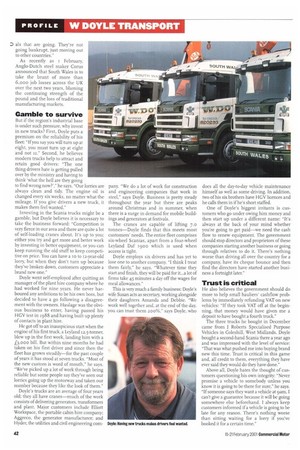0 als that are going. They're not going bankrupt, just moving out to other countries."
Page 44

If you've noticed an error in this article please click here to report it so we can fix it.
As recently as I February, Anglo-Dutch steel maker Corus announced that South Wales is to take the brunt of more than 6,000 job losses across the UK over the next two years, blaming the continuing strength of the pound and the loss of traditional manufacturing markets.
Gamble to survive
But if the region's industrial base is under such pressure, why invest in new trucks? First, Doyle puts a premium on the reliability of his fleet: "If you say you will turn up at eight, you must turn up at eight and not H." Second, he believes modern trucks help to attract and retain good drivers; "The one thing drivers hate is getting pulled over by the ministry and having to think 'what the hell are they going to find wrong now?'," he says. "Our lorries are always clean and tidy. The engine oil is changed every six weeks, no matter what the mileage. If you give drivers a new truck, it makes them feel wanted."
Investing in the Scania trucks might be a gamble, but Doyle believes it is necessary to take the business forward; "Competition is very fierce in our area and there are quite a lot of self-loading cranes about. It's up to you; either you try and get more and better work by investing in better equipment, or you can keep running the old stuff to keep competitive on price. You can have a to to 12-year-old lorry, but when they don't turn up because they've broken down, customers appreciate a brand new one."
Doyle went self-employed after quitting as manager of the plant hire company where he had worked for nine years. He never harboured any ambitions to be his own boss, but decided to have a go following a disagreement with the owners. Haulage was the obvious business to enter, having passed his I-IGV test in 1988 and having built up plenty of contacts in plant hire.
He got off to an inauspicious start when the engine of his first truck, a Leyland £2.5-tonner, blew up in the first week, landing him with a £3,000 bill. But within nine months he had taken on his first driver and since then the fleet has grown steadily—for the past couple of years it has stood at seven trucks. "Most of the new custom is word of mouth," he says. "We've picked up a lot of work through being reliable but some people say they've seen our lorries going up the motorway and taken our number because they like the look of them."
Doyle's trucks are an average of four years old; they all have cranes—much of the work consists of delivering generators, transformers and plant. Major customers include Elliott Workspace, the portable cabin hire company; Aggreco, the generator manufacturer; and Hyder, the utilities and civil engineering corn pany. "We do a lot of work for construction and engineering companies that work in steel,” says Doyle. Business is pretty steady throughout the year but there are peaks around Christmas and in summer, when there is a surge in demand for mobile buildings and generators at festivals.
The cranes are capable of lifting 7.o tonnes—Doyle finds that this meets most customers' needs. The entire fleet comprises six-wheel Scanias, apart from a four-wheel Leyland Daf 1900 which is used when access is tight.
Doyle employs six drivers and has yet to lose one to another company. "I think I treat them fairly," he says. "Whatever time they start and finish, they will be paid for it...a lot of firms take 45 minutes a day off the wages for meal allowances."
This is very much a family business: Doyle's wife Susan acts as secretary, working alongside their daughters Amanda and Debbie. "We work well together and, at the end of the day, you can trust them 200%," says Doyle, who does all the day-to-day vehicle maintenance himself as well as some driving. In addition, two of his six brothers have HGV licences and he calls them in if he's short staffed.
One of Doyle's biggest irritants is customers who go under owing him money and then start up under a different name: "It's always at the back of your mind whether you're going to get paid—we need the cash flow to renew equipment. The government should stop directors and proprietors of these companies starting another business or going through relatives to do it. There's nothing worse than driving all over the country for a company, have its cheque bounce and then find the directors have started another business a fortnight later."
Trust is critical
He also believes the government should do more to help small hauliers' cashflow problems by immediately refunding VAT on new vehicles: "If they took VAT off at the beginning, that money would have given me a deposit to have bought a fourth truck."
The three trucks he bought in December came from J Roberts Specialised Purpose Vehides in Coleshill, West Midlands. Doyle bought a second-hand Scania there a year ago and was impressed with the level of service: "That was what pushed me into buying brand new this time. Trust is critical in this game and, all credit to them, everything they have ever said they would do they have done."
Above all, Doyle hates the thought of customers questioning his own integrity: "Never promise a vehicle to somebody unless you know it is going to be there for sure," he says. "If someone says they want a vehicle at 9am, I can't give a guarantee because it will be going somewhere else beforehand. I always keep customers informed if a vehicle is going to be late for any reason. There's nothing worse than sitting waiting for a lorry if you've booked it for a certain time."




































































































